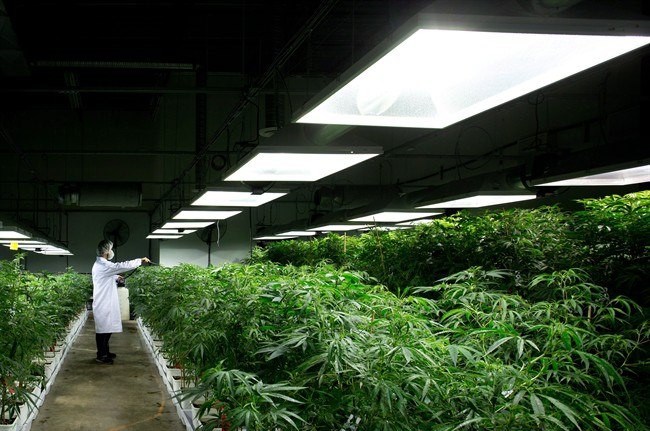With new plans for the legalization of marijuana announced this week, Attorney General Caroline Mulroney said there could still be changes to come.
“We don’t know what the market’s going to look like in six months,” said Mulroney, who is the MPP for York-Simcoe, referring to cannabis legalization as “uncharted waters.”
The provincial government will now start consultations with various groups, including municipalities, police forces, Indigenous groups and businesses, she said.
While the new plan is to first allow online sales after legalization on Oct. 17, followed by private retail sales by April 1, 2019, she said the consultation process will provide more information on future changes, such as whether private companies will be able to also sell online.
“I can’t say that they will, but I can’t say that they won’t,” she said.
Mulroney announced Monday, along with Minister of Finance Vic Fedeli, that a government agency called the Ontario Cannabis Store will run online sales after legalization starts in October.
This will be followed by a “tightly regulated” private retail model not run by government in April, according to a government press release.
The Tory government is reversing course on their Liberal predecessors' plan to have legalized cannabis distributed through publicly owned and operated stores.
The provincial government is giving municipalities $40 million during a span of two years to “help local governments keep their communities safe,” according to the press release.
The funding will be handed out on a per household basis, adjusted to ensure no municipality gets less than $10,000 in total.
Under this plan, Ontario municipalities will also have a one-time window to opt out of allowing brick-and-mortar cannabis retail stores in their communities.
With MedReleaf, a licenced producer of medical marijuana, in Bradford West Gwillimbury, the town’s Deputy Mayor James Leduc said council plans to talk to a lot of different people before deciding whether to allow retail stores.
“We want to be receptive of (MedReleaf) and respectful of them,” he said, adding he is planning to meet with its owner this week, and with council members before heading to the Association of Municipalities of Ontario (AMO) conference next week.
Leduc said BWG council members plan to meet with more people at the conference, including potentially with federal ministers, to learn more about the plan for legalizing marijuana — especially with changes still happening, despite legalization being in the works for some time.
“It seems like we’re governing on the fly,” he said. “You got buck-a-beer (and now marijuana legalization). Is Ontario going to be a party happy place, or what?”
Brent Lee, the town’s manager of enforcement, said staff will submit a report to council in September about the “current state of affairs” around marijuana legalization.
While most issues, such as driving impaired, would be dealt with by South Simcoe police, he said the town would deal with such things as land issues for businesses selling marijuana.
Town staff will work with BWG council to investigate licencing and how to deal with the retail element, Lee said.
“It’s a bit early to speculate.”
Geoff McKnight, the town’s CAO, said Monday’s announcement was good news for the town because it give it more time to get ready for potentially having marijuana retail stores.
“Deferring that until next April is helpful for municipalities. We’ve got time now — that’s positive,” he said. “I took the announcement yesterday as a positive piece.”
The window for opting out of brick-and-mortar cannabis shops also gives BWG council flexibility to decide what it wants to do, he said.
Mulroney said at Monday’s announcement the government's key objective with the new retail model was public safety.
"We will be ready to put in place a safe, legal system for cannabis retail that will protect consumers," she said. "We will also be ready to undermine the illegal market and protect Ontario's roads. Most importantly of all, we will be ready to protect our kids."
The Ontario Cannabis Store will include a three-step verification system to “ensure safe at-home delivery” of marijuana products, meeting a federal requirement that provinces be ready for retail sales for the start of legalization, read the press release.
The verification process will be for anyone accessing the website, making an order, and accepting a delivery at their front door, Mulroney said.
“Canada Post will not be allowed to leave the package at the door,” she said, adding the process could be similar to how the LCBO makes alcohol deliveries.
As well, Mulroney said the government will look into any issues of people travelling outside Canada who may be concerned about an online trail of marijuana purchases.
“The issue of travel, especially to the United States, has been discussed a lot,” she said, adding she is confident the online sales can be run in “an appropriate way.”
“It’s a significant departure of what the previous government was doing,” she said.
The province will now begin consultations about rules retailers must follow, including set hours of operation and staff training.
Federal law lays out numerous other retail requirements, including restricted advertising, that products are not visible to children, and that all sales must be made over the counter.
There will also be a zero-tolerance policy for retailers that continue operating illegally, including “severely escalating fines,” according to a government press release.
For individuals who sell or distribute illegal cannabis, or who allow their properties to be used to sell or distribute it, the maximum fine is $250,000 and/or up to two years in prison for first convictions.
For corporations under the same rule, the maximum fine is $1 million, with additional fines for each day the offence occurs or continues on additional convictions.
Mulroney said people are welcome to contact her to discuss their concerns about marijuana legalization.
“The concerns I heard before the (provincial) election are still present in many people’s minds,” she said.
— With files from Canadian Press



